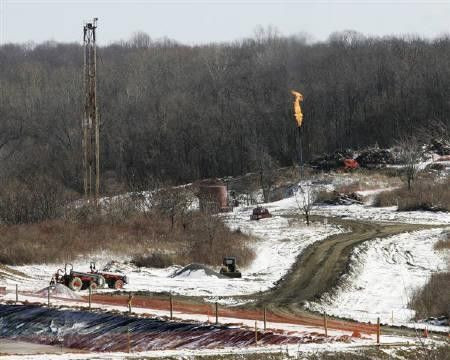Industry slams study saying Shale gas not planet-friendly

The gas industry has slammed a new study that concludes that natural gas extracted from shale formations has a greater greenhouse gas footprint - in the form of methane emissions - than conventional gas, oil and coal over a 20 year period.
Shale gas, which has become an increasingly important source of natural gas in the United States over the past decade, refers to natural gas that is trapped within shale formations. Shales are fine-grained sedimentary rocks that can be rich sources of petroleum and natural gas.
Robert Howarth and colleagues from Cornell University in New York evaluated the greenhouse gas footprint of natural gas, obtained by high-volume hydraulic fracturing of shale formations, focusing on methane emissions.
According to the researchers, methane is a far more potent greenhouse gas than carbon dioxide, but methane also has a 10-fold shorter residence time in the atmosphere. As a result, its effect on global warming falls more rapidly. Methane contributes substantially to the greenhouse gas footprint of shale gas on shorter time scales, dominating it on a 20-year time horizon. The footprint for shale gas is greater than that for conventional gas or oil when viewed on any time horizon, but particularly so over 20 years.
Compared to coal, the footprint of shale gas is at least 20 percent greater and perhaps more than twice as great on the 20-year horizon and is comparable when compared over 100 years, the study found.
The large greenhouse gas footprint of shale gas undercuts the logic of its use as a bridging fuel over coming decades, if the goal is to reduce global warming, Howarth said. The full footprint should be used in planning for alternative energy futures that adequately consider global climate change.
Against that backdrop, Energy in Depth, representing the nation's independent natural gas and oil producers, has criticized the study and wrote in a blog posting on five things to know about the Cornell Shale study.
Russell Jones, American Petroleum Institute’s senior economic adviser, called the Shale study bunk. This study lacks credibility and is full of contradictions,” Jones said. “The main author is an evolutionary biologist and an anti-natural gas activist who is not credentialed to do this kind of chemical analysis.
In supporting documents, the authors admit that the data used was of very low quality. This study is really an exercise in selective data and manipulated methodologies used to reach conclusions that deliberately contradict mainstream science,” Jones said.
Howarth, however, defended his work as meeting strict academic and scientific standards. It's being published in a highly respected journal and has been rigorously peer-reviewed, a report from Reuters quoted Howarth as saying. This is not advocacy. This is science.
© Copyright IBTimes 2025. All rights reserved.





















